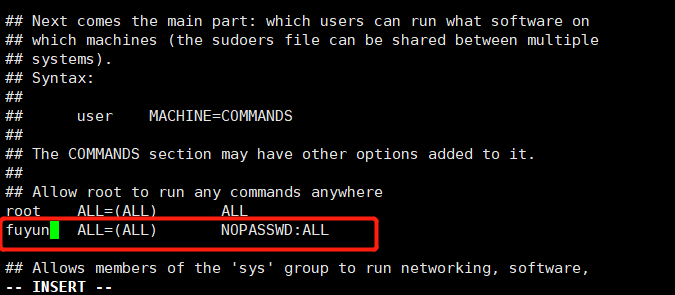Execute the command sudo useradd --help
The error is reported as follows:
fuyun is not in the sudoers file. This incident will be reported.
Reason: the user does not have root permission temporarily
Solution: modify sudoers file
Switch to the root user, su -, run the visudo command, which is used to edit and modify the / etc/sudoers configuration file.
visudo
As shown in the figure below, add user name, ALL=(ALL), nopasswd in the following location: all
## Allow root to run any commands anywhere root ALL=(ALL) ALL fuyun ALL=(ALL) NOPASSWD:ALL
Note: if NOPASSWD: is not added, the password of root account is required for every sudo.
Test:
Execute the command exit to exit the root account
Execute the first command of the article again
[fuyun@bigdata-training hive-3.1.1]$ sudo useradd -help useradd: invalid option -- 'h' Usage: useradd [options] LOGIN Options: -b, --base-dir BASE_DIR base directory for the home directory of the new account -c, --comment COMMENT GECOS field of the new account -d, --home-dir HOME_DIR home directory of the new account -D, --defaults print or change default useradd configuration -e, --expiredate EXPIRE_DATE expiration date of the new account -f, --inactive INACTIVE password inactivity period of the new account -g, --gid GROUP name or ID of the primary group of the new account -G, --groups GROUPS list of supplementary groups of the new account -h, --help display this help message and exit -k, --skel SKEL_DIR use this alternative skeleton directory -K, --key KEY=VALUE override /etc/login.defs defaults -l, --no-log-init do not add the user to the lastlog and faillog databases -m, --create-home create the user's home directory -M, --no-create-home do not create the user's home directory -N, --no-user-group do not create a group with the same name as the user -o, --non-unique allow to create users with duplicate (non-unique) UID -p, --password PASSWORD encrypted password of the new account -r, --system create a system account -s, --shell SHELL login shell of the new account -u, --uid UID user ID of the new account -U, --user-group create a group with the same name as the user -Z, --selinux-user SEUSER use a specific SEUSER for the SELinux user mapping
No longer reported wrong